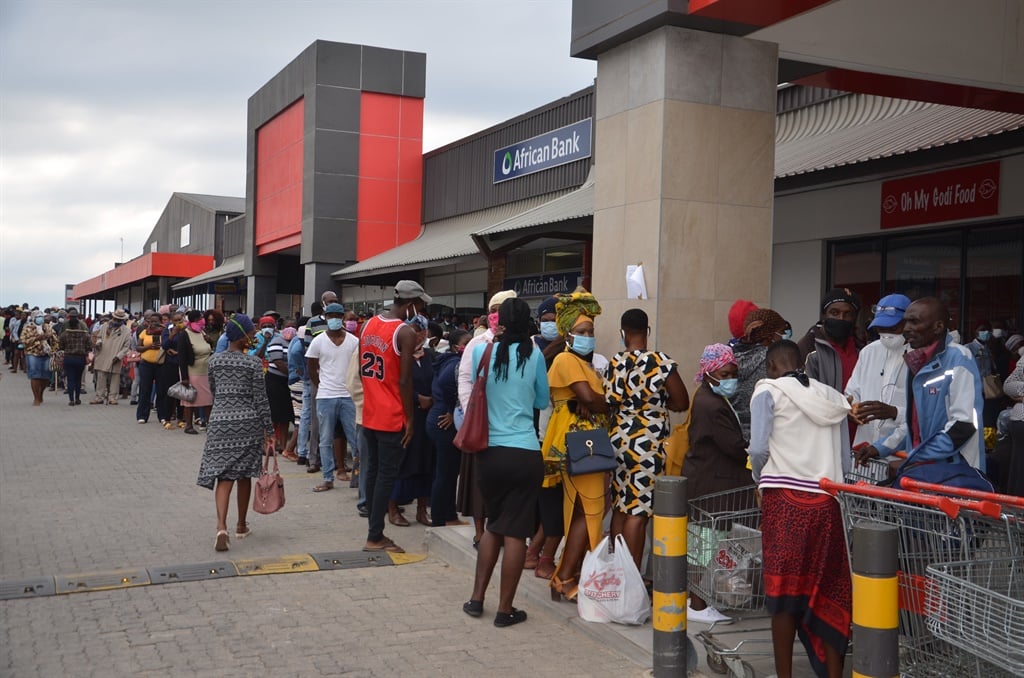


Unemployed beneficiaries in line to get their Sassa special Covid-19 social relief grants at Thulamahashe mall.
- The idea of a basic income grant is a response to the failure of government to create jobs, says an expert.
- Social Development Minister Lindiwe Zulu announced government was considering the introduction of a basic income grant.
- Another expert welcomed the idea of a basic income grant, saying government needs to find a way to get money into people’s pockets.
Government’s announcement that it is considering the introduction of a basic income grant has sparked debate, with some wondering how it would be implemented in order to address the country’s poverty levels.
Social Development Minister Lindiwe Zulu announced last week that the grant would assist South Africans between the ages of 18 and 59.
She said the discussion for the introduction of the grant had been brought back, adding that it had been going on for a very long time.
She said the grant was not something that would be implemented soon.
News24 spoke to a researcher at the Socio-Economic Rights Institute (SERI), Kelebogile Khonou, who said the idea of introducing a basic income grant was a response to the failure of the state to create jobs.
“The decision [of considering] to introduce a basic income grant is addressing a symptom of a much deeper problem,” she said.
Khonou said the grant would be a “good” thing for people struggling to find employment.
READ | OPINION | What is the BIG idea? How the basic income grant could change SA
She said those who have been struggling to support themselves and their families would be able to put food on the table.
“But I don’t think that it will have to end there,” she said, adding that for an individual to live a dignified life, job creation was essential.
Between 2017 and 2019, SERI conducted research across South Africa on how people made a living, Khonou said.
Sample
She said while the people surveyed weren’t a representative sample, for the majority their most reliable form of income for their households were grants.
“So, it was child grant or old age. So these were the most reliable forms of income for a lot of families.
“My personal opinion would be that if we were able to create enough jobs then people between the ages 18 and 59 would jump at the chance to be employed and make a living for themselves but there aren’t any jobs and therefore they really do need some income support,” Khonou said.
READ | SA facing double storm of Covid-19 and hunger
She said the basic income grant would alleviate some poverty.
However, she said if the amount was comparable to the other grants already in place, it would not be enough for people to be able to sustain themselves and live a dignified life.
“I think that there are deeper structural issues that need to be sorted out in terms of the economy in South Africa and that is an ongoing issue and that is something that we cannot continue to neglect.”
Julie Smith, a researcher at the Pietermaritzburg Economic Justice and Dignity Group, told News24 this week that the organisation would support any form of income grant that would assist individuals.
“Typically, a grant is framed within welfare, it doesn’t really help anybody get out of poverty, it just keeps them in poverty and helps people not to starve to death,” she said.
ALSO READ: Khaya Sithole | No question a basic income grant will help – the question is how to do it
However, Smith is of the view that if the basic income grant was set too low when government decides to introduce it, then the money would just be used on food, electricity and transport.
She said if it was set higher, then people would be able to use it in their livelihoods, or at least to demand goods and services.
“We need to find a way to get money flowing into people’s pockets and it was highly unlikely that we are going to deal with job crises, so people are going to have to create a livelihood.
“The money has to be higher enough to allow people to invest in their livelihood and if you set it too low, the money will just go towards consumption goods.
“So, we would agree with anything that tries to put money in people’s pocket right now.”
Isobel Frye of the Studies in Poverty and Inequality Institute said the impact of the income grant would be determined by the amount.
“If it is the upper bound poverty line of R1 227 it would provide a basic floor,” she said.
“The food poverty line is R561, anything below that will not even provide for people’s bare food needs.”

